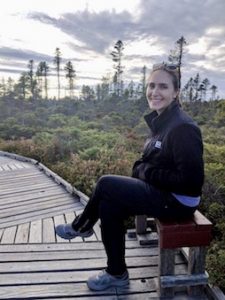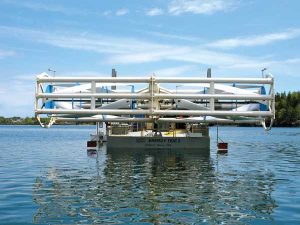Making Science Useful for Decision-makers
Gabriella Marafino did her undergraduate work in biology and applied conservation at George Mason University. She chose UMaine to get her feet wet in the social science side of things by joining the dual-degree Master’s program in Marine Biology and Marine Policy.

Working with Mitchell Center faculty fellows Jessica Jansujwicz, Gayle Zydlewski, and Teresa Johnson, Marafino is part of the Integrating and Sharing Data to Support Resilience in Maine Coastal Communities project in an effort to better understand the process by which scientific information is produced and used in permitting and regulatory decisions. The project has a particular focus on tidal power in the Western Passage near Eastport, Maine.
Marafino’s current work involves stakeholder engagement and puts her squarely in the midst of the social science element of the project, which has both biophysical and human dimensions components. One of her initial tasks has been to inventory, catalog, and summarize existing formal and informal data pertaining to the Western Passage.
“Our research team at the Mitchell Center is focused on the human dimensions piece of the project, and my role is investigating how to better understand and improve the data production and sharing process to provide more useful information to decision-makers,” Marafino says. “This involves integrating all the disparate data sources relative to the Western Passage ecosystem.”
This effort—to have a clear ecosystem-wide picture of the area, including the physical features and animal inhabitants—is necessary if energy-generating turbines are to be placed in the waters at Western Passage.
As part of the effort, the team met with stakeholders in late September for a three-hour workshop. There, Marafino shared her initial compilation of existing data.
“Because I come from more of a biophysical background, as I was compiling all this information I was thinking that we’d need the raw data to work with and then build from there and conduct analyses,” she says.
But during the workshop she discovered that, from the perspective of stakeholders and decision-makers, it was not raw data they needed and used for the most part, but, rather, synthesized data, reports, and published texts.

“It was really interesting to hear what kind of decisions they’re making and what kind of information they’re using to make those decisions,” says Marafino. “And another thing I gathered was that it’s really hard for decision-makers to find all this existing information in one place, so when they’re trying to make decisions, this information is not very accessible, it’s not in a central location.”
Marafino adds that there is a lot of information out there relevant to the project and to the stakeholders, “but we need to make sure we’re being responsive to what data they say is usable to them, how accessible it is, and how we can best tailor the data integration approach to help in their decision-making.”
The ultimate goal of the work is to use stakeholder input and insights on usable and accessible data to create some sort of decision support tool, the details of which are yet to be decided.
But Marafino, who has a lot experience in geographic information system (GIS) work, says that there was discussion at the first workshop suggesting that it would be helpful to compile the Western Passage information in GIS and spatially represent the various components, e.g., marine mammals, fish, plankton and the physical data, in layers. “And you could turn layers on and off so you could look at individual data layers or look at everything together with an ecosystem-wide perspective.”
Noting that there will be three more quarterly stakeholder workshops as part of the project, Marafino says, “I’m excited to be doing all this research in the Mitchell Center because I think that examining and analyzing this sort of decision-making process can be applicable to renewable energy development at other sites, and some of the lessons learned could contribute to other sustainable development efforts.”
—David Sims
